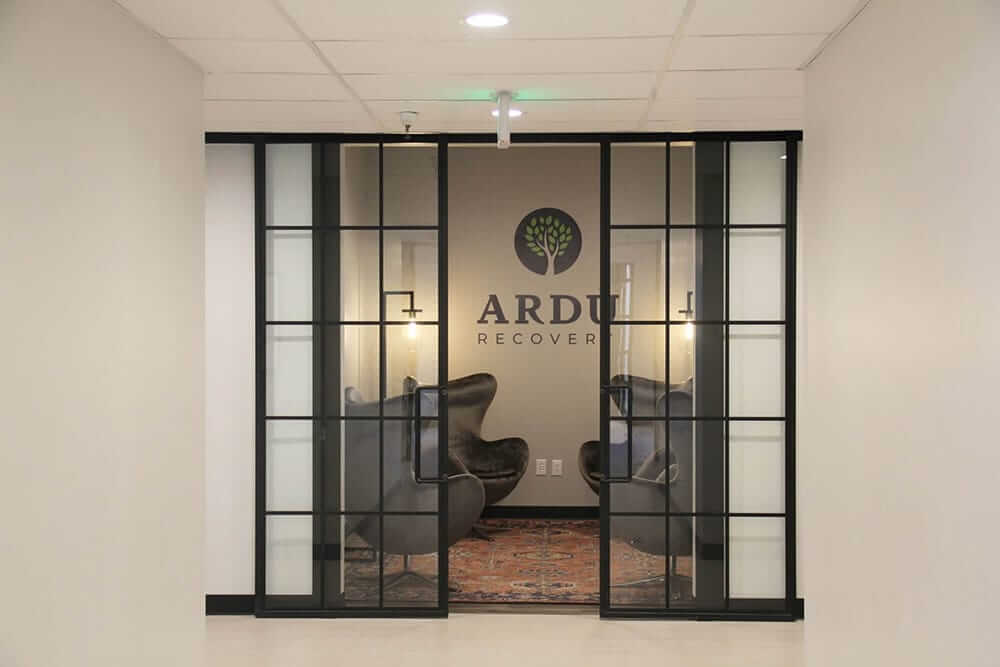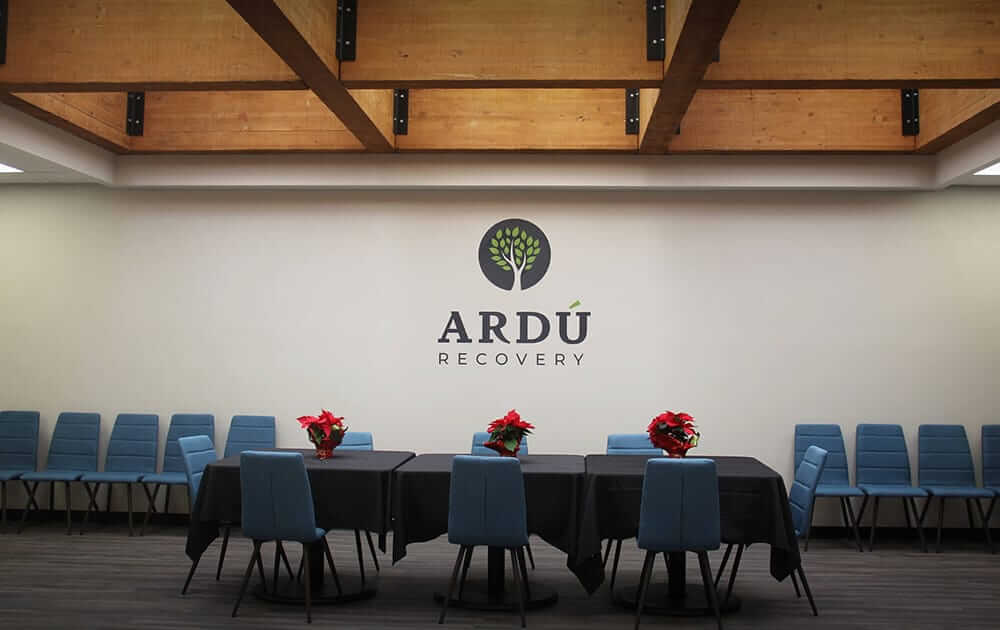Written by Drew Redd. Mina Draskovic, B.Psy., reviewed this content for accuracy.
Ardu was a place of which I felt safe, giving me the will to learn about myself. The staff are people I look up to, due to the way they listen and offer loving support…Change was hard for me and Ardu’s staff and facility made it that much easier to change my life for the better.
A dual diagnosis means that you are suffering from a mental health issue and a substance addiction at the same time. You’re fighting two battles, and you don’t have to navigate this complex journey by yourself.
Our dual diagnosis treatment program provides a holistic approach to recovery. We understand the intricate relationship between addiction and mental health, and we’re here to guide you toward healing.
Take that crucial first step towards lasting recovery by reaching out to our addiction treatment center. You don’t have to face a dual diagnosis alone—we’re here to support you in regaining control of your life.








According to the Substance Abuse and Mental Health Services Administration’s (SAMHSA) national report, one out of four people with a mental illness has an addiction.
Dual diagnosis treatment is an important part of mental health care for individuals who suffer from both substance use disorders and a psychological illness.
Without proper treatment, an addicted person may struggle to find relief from their symptoms and may be unable to break free from the cycle of substance abuse.
There is a strong connection between mental health disorders and substance abuse. According to the National Institute on Drug Abuse (NIDA), “of the 20.3 million adults with substance use disorders, 37.9% also had mental illnesses,” while “among the 42.1 million adults with mental illness, 18.2% also had substance use disorders.”
This relationship is often referred to as comorbidity, and there are several factors that contribute to it:
It is crucial to address both mental health disorders and substance abuse simultaneously through integrated treatment programs. Our dual diagnosis rehab programs aim to address the underlying causes of both conditions and provide comprehensive support for people to achieve recovery and live healthier lives.
The National Alliance on Mental Illness (NAMI) cites that “substance use disorders — the repeated misuse of alcohol and/or drugs — often occur simultaneously in individuals with mental illness, usually to cope with overwhelming symptoms… Either disorder (substance use or mental illness) can develop first.” That is why it’s crucial to address possible co-occurring conditions when treating an addiction disorder.
Our dual diagnosis treatment program provides integrated care for co-occurring substance use and psychiatric disorders. A core focus is on simultaneously treating addiction and mental health conditions.
Treatment begins with a comprehensive assessment by a team of mental health professionals to gain a detailed understanding of both disorders. This allows for the development of an individualized treatment plan that identifies appropriate therapies and medications to address each condition.
A psychiatric disorder treatment program and addiction treatment should work in tandem, with cross-trained clinicians and addiction treatment specialists providing coordinated mental health treatment and substance abuse interventions. Integrated therapy sessions target issues related to both aspects of treatment.
The integrated approach continues through discharge planning and aftercare to provide ongoing dual diagnosis management. Maintaining recovery is seen as an ongoing process requiring consistent mental health treatment and addiction support services.
The ultimate goal is to give clients the tools to achieve lasting sobriety and psychiatric symptom management. By making dual diagnosis treatment the priority, programs can improve outcomes for people dealing with complex co-occurring conditions.
Many individuals struggling with addiction also face co-occurring mental health disorders that contribute to their substance abuse. Successful treatment of addiction often requires identifying and addressing any co-occurring mental health conditions through an integrated treatment approach.
Here are the most common dual diagnosis disorders:
Anxiety disorders like generalized anxiety disorder (GAD), post-traumatic stress disorder (PTSD), obsessive-compulsive disorder (OCD), and panic attacks frequently co-occur with substance abuse.
Co-occurring mental health conditions related to anxiety can cause people to self-medicate with drugs or alcohol, while substance abuse can also exacerbate anxiety symptoms. An integrated approach to treatment is needed to help people develop healthier coping skills.
Mood disorders such as bipolar disorder, major depressive disorder, and persistent depressive disorder are some of the most common co-occurring issues seen with substance abuse.
Addictive substances may be used to self-medicate mood symptoms, or substance abuse can worsen mood instability. A dual diagnosis approach provides comprehensive care for both issues simultaneously.
People with personality disorders such as borderline personality disorder, antisocial personality disorder, and narcissistic personality disorder exhibit very high rates of co-occurring addiction.
Their substance abuse is often an unhealthy coping mechanism for overwhelming emotions and instability associated with the personality disorder. Dual recovery treatment can help those with addiction and personality disorders work through underlying psychological issues.
Attention deficit hyperactivity disorder (ADHD) is a very common dual diagnosis disorder, as those with ADHD often use substances to self-medicate. Effective options for treatment involve therapy and medications to manage ADHD symptoms, along with addiction treatment.
Eating disorders like anorexia, bulimia, and binge eating are often accompanied by co-occurring substance abuse, which serves to reduce guilt about disordered eating, for example.
A comprehensive approach to dual diagnosis treatment that involves an eating disorder should assess both aspects of treatment simultaneously under the watchful eye of addiction treatment professionals and an eating disorder treatment team.
At our substance use disorder treatment center, we understand the complex and often intertwined nature of addiction and mental health challenges. That’s why we’ve designed our dual diagnosis programs to provide comprehensive, gender-specific, primary, and long-term treatment options for people seeking recovery in a serene and supportive environment.
We understand that addressing both addiction to drugs and alcohol abuse, along with co-occurring mental health issues, is crucial for a successful recovery. Our dual diagnosis detox services are designed to provide you with the comprehensive care you need to regain control of your life.
Our team consists of experienced medical professionals and a dedicated staff who are committed to your well-being. They bring their expertise to ensure your safety and comfort throughout the detox process. With their guidance, you can rest assured that you are in capable hands.
Our medical detox program includes medication-assisted treatment (MAT), a proven approach to managing cravings and withdrawal symptoms. MAT is administered by our medical staff under careful supervision to make your detoxification process more manageable. This approach significantly increases your chances of a successful recovery.
And, if you want to alleviate the symptoms of detox without the use of medications, we also offer a holistic care approach. Our holistic approach embraces your emotional and spiritual well-being as well. Holistic options include therapies like mindfulness practices, yoga, equine therapy, acupuncture, and art therapy. These holistic detox therapies can help you find balance, reduce stress, and rediscover your inner strength during your recovery journey.
Are you or a loved one suffering from a drug or alcohol use disorder and in need of detox services? Contact our alcohol detox and drug detox facilities and we’ll meet you at any level of care to help you achieve lasting sobriety.
At our addiction treatment facility, we understand the complexities of alcohol addiction and drug addiction. Our dedicated team is here to guide you on the road to recovery. We offer specialized dual diagnosis rehab services that address both your substance abuse and any underlying mental health issues. You don’t have to face this journey alone—our alcohol treatment centers and drug rehab programs are here to support you every step of the way.
An inpatient treatment plan can be a crucial step in your recovery, as inpatient treatment helps you to develop coping skills and strategies for managing your addiction and mental health disorder in a safe, predictable environment.
Our residential treatment for addiction provides supportive inpatient care in a structured environment. You’ll experience a daily routine that’s carefully designed to help you heal. Our dual-diagnosis residential addiction treatment center focuses on daily tasks that aid in your recovery journey.
At our residential program, you’re not just a patient; you’re a valued individual on the path to a healthier future.
For those seeking flexibility in their recovery journey, our outpatient programs offer the perfect solution.
Our intensive outpatient program allows you to continue with your daily lives while receiving intensive therapy, and we also offer a partial hospitalization program for those who want to stay at a facility but can’t commit to a full inpatient treatment program.
We understand that life doesn’t stop during recovery, and our program is designed to fit into your schedule. We’re here to support you as you take charge of your healing process.
We believe in creating a supportive environment with compassionate care at the core of our services. Our gender-specific services recognize the unique needs of each individual. Whether you’re a man or a woman, we’re committed to providing tailored support that aligns with your specific journey to recovery.
You’re not alone; we’re here to walk this path with you, providing the care and understanding you deserve. We offer both women’s detox and women’s rehab services, as well as men’s detox and men’s rehab services. Contact us to learn more.
At our addiction treatment facility, we believe in a multifaceted approach to healing. We understand that people with co-occurring mental health and substance abuse issues require comprehensive and tailored therapies to address their unique challenges. Some of the therapies we offer include:
Behavioral therapy, including cognitive-behavioral therapy (CBT), rational emotive behavior therapy (REBT), and dialectical behavior therapy (DBT), is a cornerstone of our treatment approach. These evidence-based therapies are particularly beneficial for individuals with co-occurring mental health and substance abuse issues.
CBT helps you identify and change harmful thought patterns, emotions, and behaviors related to addiction, providing tools to manage cravings. Rational emotive behavior therapy helps you explore and manage your emotions, while dialectical behavior therapy equips you with coping strategies for emotional regulation and interpersonal effectiveness.
These therapies work in harmony to address both addiction and mental health concerns, fostering lasting recovery.
Our family program plays a crucial role in supporting individuals with co-occurring issues. Addiction often impacts not only the individual but also their loved ones. Family therapy sessions help repair relationships, enhance communication, and educate families on how to support their loved ones’ recovery.
By involving families in the healing process, we create a strong support network that can aid in the recovery of both addiction and mental health challenges.
Motivational interviewing, conducted through individual therapy, is a valuable tool for individuals facing co-occurring issues. It focuses on enhancing intrinsic motivation to change and helps you explore your goals, values, and aspirations.
This therapeutic approach is particularly effective in addressing ambivalence about recovery, as it encourages self-reflection and empowers you to make positive changes in your life.
Experiential therapy is a type of therapy that involves engaging in hands-on activities and experiences to promote self-awareness and emotional healing. Through experiential therapy, you can process trauma, improve self-esteem, and learn healthy coping mechanisms, addressing both addiction and underlying mental health concerns.
Proper nutrition plays a vital role in mental and physical well-being. Our nutrition counseling services provide education on the importance of a balanced diet and how it can positively impact your mental health and recovery. Nutritional support can help stabilize mood, boost energy levels, and improve overall health, complementing your journey to recovery.
Alternative therapies, including adventure therapy, fitness therapy, yoga therapy, music therapy, and other recreational activities, offer diverse approaches to healing. These therapies engage the mind and body, promote relaxation, reduce stress, and improve emotional well-being. They can be particularly effective for individuals with co-occurring issues by providing holistic options that cater to various aspects of their recovery journey.
The dual diagnosis approach sees the journey to recovery from substance abuse and mental health disorders as a long-term process that requires comprehensive individualized care and integrated services to address both conditions simultaneously. Components of dual diagnosis treatment include:
The key component of effective dual diagnosis treatment is integrated care that addresses both disorders simultaneously. Treatments for substance abuse disorders, physical health, and mental health issues are combined within the same setting and provided by cross-trained staff.
During the comprehensive assessment phase, a thorough assessment is conducted to get an accurate diagnosis, understand the nature of both disorders, how they interact, the client’s medical and psychosocial needs, and the most appropriate treatment options. Though the initial assessment is the most important, it is crucial to maintain the comprehensive approach and have continuous assessments throughout treatment.
Individual counseling and group therapy sessions incorporate evidence-based treatment for substance abuse issues and specific mental disorders (for example, cognitive-behavioral therapy for anxiety and dialectical behavior therapy for borderline personality disorder). The focus is on building healthy coping skills and managing symptoms.
Clients are prescribed medications to help manage withdrawal symptoms, prevent substance use relapse, and treat mental health symptoms. For example, a doctor may prescribe mood stabilization treatment in addition to medication that alleviates symptoms of withdrawal if the person in question suffers from a mood disorder. Medications are carefully managed by a psychiatrist to avoid adverse interactions.
Case managers coordinate care across the different services, provide access to community resources, assist with housing, employment, healthcare and other needs. This provides stability and support during treatment.
Clients are connected to 12-step programming such as Alcoholics Anonymous and Narcotics Anonymous and peer support groups to enhance motivation, build social support among those with shared experiences and maintain sobriety post-treatment.
Clients develop relapse prevention skills, identify triggers, and establish a crisis plan for managing relapses and staying engaged in recovery. Relapse prevention is seen as a common part of the long-term recovery process.
Following completion of primary treatment, clients are offered an aftercare plan through continued participation in outpatient treatment, sober living housing, and recovery coaching to help provide ongoing support and reduce the risk of relapse.
Treatment at a specialized dual diagnosis treatment center provides many advantages for people facing co-occurring substance abuse and mental health disorders. These integrated treatment facilities offer comprehensive evidence-based care to concurrently address addiction and mental illness. By treating the whole person, dual diagnosis centers can facilitate long-term recovery.
Dual diagnosis centers develop customized treatment plans that address both the addiction and co-occurring psychiatric illness. Mental health professionals assess each client thoroughly to create an individualized treatment plan.
Treatment plans customized to each client’s unique needs are critical for dual diagnosis clients. With two complex interacting disorders, a tailored, individualized approach helps address the root causes and nuances of each person’s conditions.
Dual diagnosis centers offer integrated treatment where substance abuse and mental health therapies are combined. This coordinated approach treats the entire person.
Integrated treatment coordinates substance abuse and mental health interventions, which is ideal for dual diagnosis clients. It treats both disorders comprehensively rather than addressing just one issue.
Trauma therapy and trauma-informed care practices are often used to help clients who have trauma histories. There is a high prevalence of trauma in dual diagnosis populations. Trauma therapy and trauma-informed care helps clients process traumas that may be contributing to substance abuse and mental health problems.
The broad spectrum at quality dual diagnosis centers allows clients to access a diverse range of therapies to meet their needs. With co-occurring disorders, different therapy modalities are often required. The broad spectrum at dual diagnosis centers allows access to diverse therapies for a customized approach.
Long-term dual diagnosis treatment centers provide extended care of 90 days or longer, allowing time to fully address both disorders. Providing 90 days or more means adequate time to treat complex dual disorders that require long-term lifestyle changes and the development of everyday life skills to cope with the condition.
The serene, peaceful settings at dual diagnosis centers support clients’ healing and focus on lasting recovery. The privacy and serene environment for individuals suffering from substance abuse offered at treatment centers helps dual diagnosis clients reduce anxiety, decompress, and engage fully in the therapeutic process.
Ongoing aftercare provides continued support after treatment to maintain sobriety and mental wellness over the long term. Continued aftercare prevents relapse and maintains mental health stability long-term, which is key for ongoing dual disorders management.
If you’re searching for a dual diagnosis treatment center in Utah to address substance abuse and addiction alongside mental health concerns, your search ends here.
Our dual diagnosis recovery center, nestled in the breathtaking Wasatch Mountains, is specifically designed to meet your unique needs.
Our state-of-the-art facilities provide a serene and therapeutic environment for your recovery journey, complemented by amenities such as a sauna, a fully-equipped gym, and a rejuvenating float spa.
Anyone struggling with drug or alcohol abuse or addiction can be eligible to enroll in our dual diagnosis facility.
Our recovery center welcomes people seeking help to overcome their addiction. Our dedicated team of professionals is here to guide and support you in your addiction treatment process, laying the foundation for long-term recovery and relapse prevention.
To enroll in an Ardu program, contact Ardu Recovery Center online or via phone (801-810-1234). We will work with you to find a recovery path that works for you during the detox process and beyond. Read more about our simple admissions process on our admission process page.
You can pay for treatment with your insurance at Ardu if your health insurance providers cover our treatment services (we accept most insurance companies). If you want to verify your insurance coverage and gather more payment information, visit our insurance verification page.

Drew Redd is the executive director of Ardu Recovery Center and is dedicated to empowering people on their journey to sobriety.
The most effective treatment for dual diagnosis involves a holistic approach to recovery. This approach recognizes the interplay between substance use disorders and mental health challenges and addresses both aspects simultaneously to achieve lasting results.
There is no cure for dual diagnosis, as it is a complex condition involving both substance use disorders and mental health issues. However, with the right treatment and ongoing support, people can manage their symptoms, achieve recovery, and lead fulfilling lives.
Current treatment approaches for dual diagnosis typically involve multiple components of recovery. These include evidence-based therapies, medication management, support groups, and holistic interventions that collectively address the interconnected challenges of substance use and mental health disorders.
The exact number of people with dual diagnosis is unknown and can vary significantly in different geographical locations, as it depends on factors such as geographical, economic, and demographic characteristics.
However, it’s estimated that a substantial portion of people struggling with addiction also have co-occurring mental health issues (about 37.9%, according to NIDA).
Two of the most effective forms of treatment for mental health disorders are psychotherapy, which includes various therapeutic approaches like cognitive-behavioral therapy (CBT) and dialectical behavior therapy (DBT), and medication management. These treatments are often used in combination to address the specific needs of individuals with mental health challenges, offering a comprehensive approach to recovery.
Does alcohol affect birth control?